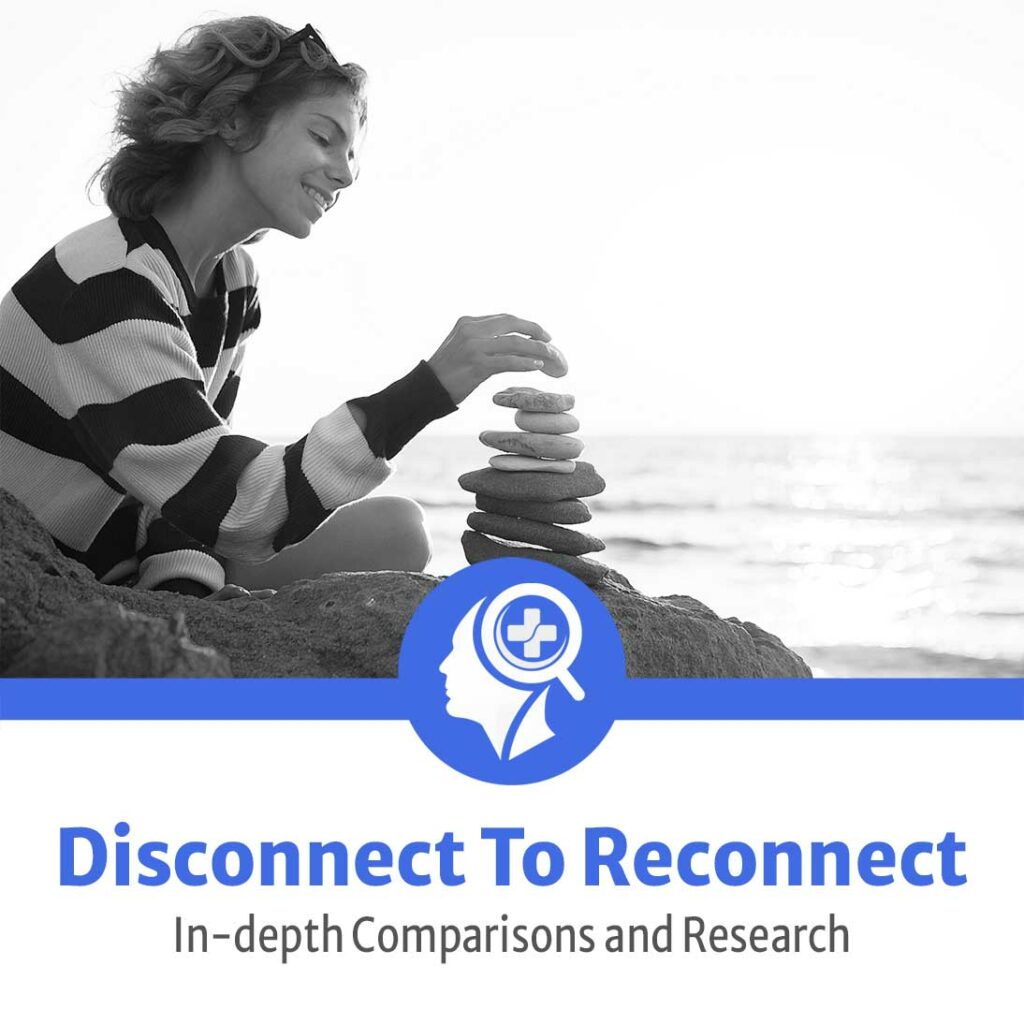
These days it can be very challenging to find a moment of freedom or peace. While it’s great that we now can stay in contact with anyone we meet, it can be a lot. Between distractions, notifications, and social media, it’s almost impossible to disconnect and find a moment for ourselves.
Members of FinditHealth found that disconnecting to reconnect can increase your happiness. By disconnecting and taking time for yourself, you can experience the present moment and enjoy the little things again. Keep reading to learn tips on how to start disconnecting in your daily life.
SUBSCRIBE for FREE STRESS MANAGEMENT TECHNIQUES from our EXPERT COACHES!

Disconnect To Connect Meaning

In the context of this article, when we speak of the term disconnect, we are referring to a digital detox from technology and everyday life.
To disconnect means separating yourself from all technology and distractions that absorb your time and attention.
This includes TV, phones, iPads, and laptops. Research has shown that the average person spends almost 10 hours online daily, which is a bit wild!
We are not saying that technology is not a great tool but instead use our time wisely with it. By disconnecting from technology and other distractions, we are giving ourselves space to learn new things and nurture relationships around us. When we disconnect, we allow ourselves to live in the present moment and experience a more direct connection with ourselves and others.
SUBSCRIBE for FREE STRESS MANAGEMENT TECHNIQUES from our EXPERT COACHES!
Disconnect To Reconnect Quotes

Quotes can be an excellent tool to help inspire us on our path to disconnect and reconnect.
Sometimes you have to disconnect to stay connected. Remember the old days when you had eye contact during a conversation? When wasn’t everyone looking down at a device in their hands? We’ve become so focused on that tiny screen that we forget the big picture, the people right in front of us.
- Regina Brett
The more in harmony you are, the more joyful you are and the more faithful you are. Faith is not disconnecting you from reality – it connects you to reality.
- Paulo Coelho
We need time to defuse, to contemplate. Just as in sleep, our brains relax and give us dreams, so at some time in the day, we need to disconnect, reconnect, and look around us.
- Laurie Colwin
Work is essential, but you also need to disconnect, to unplug at times to be even more concentrated when you do work.
- Massimiliano Allegri
SUBSCRIBE for FREE STRESS MANAGEMENT TECHNIQUES from our EXPERT COACHES!
Why Is It Important To Disconnect?

It’s essential to disconnect because always being available is not suitable for your mental health. We have no time to relax when we are constantly on, which can increase stress and anxiety.
There are also a variety of other reasons why it’s so important to disconnect.
Healthy Relationships
One of the significant consequences of always being plugged into technology is that it takes us away from our relationships and the present moment. A lot of us feel that we are always connected to our devices and have lost time for meaningful in-person connections. Putting the phone away gives you more time to communicate with your partner, friends, and family.
More Productive At Work
Disconnecting can be an excellent way to improve your productivity at work. By being on your computer all day at work and then going home to the TV, you spend all day in front of screens. Instead, give yourself breaks at work and take your lunch outside, away from distractions. You will return to work with more energy by giving yourself these breaks, thus improving your productivity.
Better Sleep
We all should know by now that technology affects sleep. Technology stimulates and keeps your brain alert long after you put away your smart devices. Turning off devices two hours before bed sets you up for better sleep. Instead of watching TV most evenings, try reading a book or going on an evening walk with a friend or partner. By using this time to unwind and relax, your sleep will improve tremendously.
Mental Health
By not disconnecting, you are hurting your mental health in the long run. Technology and social media have famously created what we now know as FOMO, or fear of missing out. This FOMO leads to an almost addictive behavior with smart devices and apps. You feel like you constantly have to check in because you are missing out on what others are doing. This also leads to a nasty comparison game because you could be comparing yourself to what you are missing out on. This can result in more stress and anxiety, lower self-esteem, and increased depression.
Never Evolving
Lastly, being connected leads to boredom because you are not learning and using creative energies. By constantly being stimulated by information and technology, you are not giving your brain the time to process and digest the information you are receiving. Our brains get so overloaded that we don’t have the time to be creative, leading us to become stagnant in life.
SUBSCRIBE for FREE STRESS MANAGEMENT TECHNIQUES from our EXPERT COACHES!
How Do I Disconnect?

Keep reading for some simple tips you can try today.
Be Intentional With Screen Time
Set limits on how often you will check your email and phone. We recommend creating a morning routine that suits your mental health and checking email after. Starting the morning free of screens is one of the best things you can do for your mental health. It’s allowing yourself to start on a good foot first thing in the morning instead of getting distracted by notifications and experiencing stress for the day.
You can also look at putting your phone on do not disturb throughout the day. For example, it’s always good to have your phone on do not disturb in the evening but maybe keep it on this setting if you have substantial work projects in the morning. Sometimes it is easiest to turn off or mute all distractions, so you do not see them to stay focused.
Lastly, if you are curious about how much time you spend on your phone and computer, look at the settings. Luckily, most phones today include options that measure usage time and allow us to limit and block specific apps. Analyze the time spent on each one of them and set a disconnection goal. Maybe you also set time limits for apps on your phone, like Instagram, or delete them entirely.
Spend Time In Nature
Spending time in nature benefits your mental health and is something you can easily do daily. Whether it’s taking a trip to your backyard or a local park, getting outside is one of the best ways to disconnect. Research has even shown that walking in nature can lead to better health and a lower risk of depression. The ways you spend time in nature are endless, and it’s an easy way to disconnect because you can leave your phone at home.
Include Your Family & Friends
We think this is an essential tip to include because we always succeed better when we are supported. Bring up the idea of disconnecting to reconnect with your friends, family, and significant others and even encourage them to join you. When smart devices and technology are away, this allows for deeper listening and connection because you are not distracted.
Listening is a vital part of any healthy relationship and can improve trust, intimacy, and respect for one another. You can start small by saying something as simple as no cell phones at the dinner table or during any quality time conversations.
Start A Mindfulness Practice
You are giving yourself more time by turning off distractions, and what a great time to practice mindfulness. Mindfulness is an excellent tool for mental health and self- care because it focuses on present-moment awareness and living in the moment.
Research has shown that people with regular mindfulness practice live happier lives. Meditation can be an excellent way to practice mindfulness, or simply getting outside to look at nature can work. Mindfulness is about disconnecting from your thoughts to reconnect with your body and physical sensations.
Frequently Asked Questions


What does it mean to reconnect with yourself?
To reconnect with yourself is to slow down and learn who you are as a person. It’s giving yourself space and time without distractions to explore and get curious about yourself. By prioritizing your self-connections, you will make better choices that keep you on the life path you are meant to pursue. You will have more confidence, feel more at peace, and have better relationships with yourself and others.
What is the difference between connecting and disconnecting?
Disconnecting is the act of breaking a connection with something or someone. Connecting is the act of bringing everything back together.
How do you reconnect with someone?
To reconnect with someone, start by being direct and contacting them to make plans. Show initiative by sending a simple text or giving them a call. By prioritizing the connection and valuing their passions and life, you should be able to reconnect with someone.
What is a disconnect in a relationship?
Disconnecting in a relationship can feel like the two of you are growing apart, not spending as much time together, and just not valuing your partner as you did previously.
Conclusion – Research by Findithealth.com


Disconnecting to reconnect can be an excellent way to live in the present moment and experience new things. Today is as good as any day to start and discover ways to disconnect to reconnect with yourself and others.
Members of the research team at FinditHealth found that the benefits of disconnecting are infinite, from becoming healthier, more productive, and organized, and even better sleep! We encourage you to try out many of the tips listed in the article, and we hope you have fun on the journey of reconnecting with yourself and others.
SUBSCRIBE for FREE STRESS MANAGEMENT TECHNIQUES from our EXPERT COACHES!

